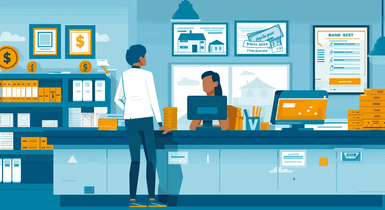Good Mortgage Rate: All What You Need to Know
Contents

The dream of owning a home often begins with envisioning the financial path, and at the heart of this process lies the mortgage. One of the most critical factors shaping your monthly payments and the overall cost of the loan is the mortgage rate. However, lending conditions are far from uniform. In reality, your financial profile, particularly your credit score, plays a pivotal role in determining the rate you’ll receive.
The link between credit score and mortgage rates is direct and profound. A higher credit score typically unlocks more favorable terms, while a lower score can drive up interest rates. That’s why it is vital to understand how mortgage rates by credit score affect your options. In this article, we will explore what defines a good mortgage rate and the factors influencing your mortgage terms.
What is a Good Mortgage Rate, and How Does Credit Score Impact It?

Defining a good mortgage rate isn’t straightforward since, first and foremost, mortgage rates change over time, and the notion of a good rate is relative. For instance, the average 30-year interest rate of 6.81% in 2023 seems reasonable compared to the average rate of 10.13% in 1990. Yet, it’s steep when contrasted with 2.96% in 2020 or even 5.34% in 2022. Obviously enough, for a borrower, the lower the rate, the better—and your personal credit rating plays a significant role in achieving favorable terms.
Your credit score, a measure of creditworthiness, reflects your borrowing history of borrowing and debt repayment habits. It serves as an authentic evidence of your diligent financial behavior and financial stability, demonstrating the likelihood of repaying your mortgage on time and in full. It’s no wonder your credit score is a top consideration for a lender when assessing the risks of offering a mortgage loan.
Mortgage Rates Based on Credit Score
Lenders adjust interest rates based on perceived financial risk. Generally, borrowers with higher credit scores are considered lower risk and are rewarded with better rates. Conversely, lower credit scores often lead to higher interest rates to offset the increased risk for lenders.
Most mortgage lenders rely on FICO ratings to evaluate a borrower’s financial health and ability to repay. Thus, mortgage rates for an 800 credit score typically secure the lowest rates, while individuals with scores going beyond 669 will struggle to win low interest rates, enabling them to save thousands of dollars over the life of their loan. All in all, a sweet spot for lower homeowner loan rates is anything that goes above 670. Statistically, 67% of Americans have a good FICO score, demonstrating the importance of credit management.
Benefits of Higher Credits Scores for Mortgage Borrowers
Above a lower mortgage rate based on credit score, higher credit ratings ensure a few other valuable perks for financially sound borrowers:
- Better approval odds: A higher credit score gives borrowers greater flexibility. You’re more likely to qualify for the mortgage amount you need to purchase your desired home.
- Favorable loan terms: Enjoy reduced fees, smaller down payments, and the possibility of avoiding private mortgage insurance (PMI), which can save significant upfront costs and make buying a home more affordable.
- Expanded mortgage options: A higher credit score unlocks access to a broader range of mortgage options, whether you’re looking at conventional loans, FHA loans, VA loans, or others, allowing you to find the best fit for your needs.
Other Factors That Determine Mortgage Rates

At this point, it’s clear that your credit is one of the crucial factors determining your mortgage rate. Though you don’t necessarily need an 800 credit score for the mortgage rate with the best conditions, your rating should fall within a “good” FICO range to assure leaders of your strong financial standing.
At the same time, lenders consider a set of other factors. You should be aware of them to navigate the mortgage market more effectively and potentially secure better loan terms.
Your Employment and Income
Lenders want to see stability and your ability to repay the loan. Steady employment and consistent incomes usually result in lower interest rates and less strict lending criteria. Irregular income or unsteady jobs can hinder your ability to qualify for a good mortgage rate—or even a loan.
Debt-to-Income Ratio (DTI)
Your DTI is a measure of your monthly debt payments relative to your gross monthly income. Lenders evaluate this ratio to determine how well you can handle new debt. A lower DTI suggests you have more income free for mortgage payments, making you appear as a less risky borrower.
Loan-to-Value Ratio (LTV)
LTV is the ratio of your loan amount to the property’s current value. Lenders use this ratio to estimate loan risks. A lower LTV means you have greater equity in the property, thereby decreasing the lender’s risk in the event of default.
Loan Type and Length
The type of loan you choose also impacts mortgage rates and credit score required. Thus, conventional loans with fixed interest rates call for a higher credit score of above 670. FHA loans, on the other hand, set a lower score requirement of 500+ yet require a substantial down payment and come with higher rates. Jumbo loans are the most demanding in terms of credit. To qualify for a loan over $500,000 and get a good rate, a rating of 720+ is required.
Additionally, shorter loan terms typically have lower rates, though monthly payments may be higher, while longer terms may have higher rates but lower monthly payments accordingly.
Down Payment Amount
Larger down payments signal stability and reduce the lender’s risk, potentially leading to better interest rates. Meanwhile, a smaller down payment may result in higher rates and additional costs, such as PMI, to mitigate the lender’s risk associated with higher loan-to-value ratios.
Market Conditions
Along with borrower-specific factors aside, lenders can’t disregard broader markets. Thus, economic factors such as inflation, overall economic growth, general credit market changes, and Federal Reserve policies can also influence mortgage rates, regardless of individual credit scores.
Credit Score Improvement Tips

To increase your chances of qualifying for a better mortgage rate by credit score and secure good terms of loan, you can improve your rating before applying for a mortgage. Here are practical steps to boost your score:
- Review your credit report: Obtaining your report from Equifax, Experian, or TransUnion. Watch for any errors or inaccuracies that could be dragging down your score, and dispute any errors.
- Pay bills on time: Maintain a consistent payment history by covering all bills—credit cards, loans, utilities, and rent—punctually.
- Lower credit card balances low: Aim to keep balances below 30% of your credit limit. Consider focusing on paying off high-interest credit card balances first to lower your overall credit utilization ratio.
- Avoid new credit applications: Refrain from opening new credit accounts shortly before applying for a mortgage.
- Diversify your credit mix: Show your ability to manage different types of credit, such as installment loans and revolving accounts.
- Keep accounts open: Retain older accounts to build a longer credit history, even if they’re inactive.
Conclusion
While securing a mortgage depends on various factors, a higher credit score undoubtedly gives borrowers a significant advantage. It not only helps secure lower interest rates and reduced monthly payments but also grants access to a wider array of loan options. With careful financial planning and credit management, you can position yourself for success in achieving your homeownership dreams.




